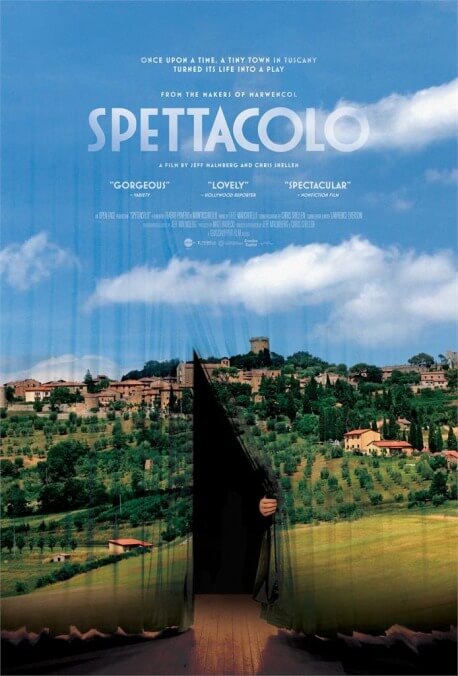Thus, Malmberg and Shellen (who respectively directed and produced the 2010 documentary Marwencol) adopt an appropriately elegiac approach to Spettacolo as it chronicles both the birth of a new play and the slow, unceremonious demise of the town. The aging participants decide to do a show about the “end of the world,” in light of Monticchiello’s socioeconomic malaise and the general distress that pervades the sparse population. Everyone in town has an acute awareness of not just their own mortality but also the impermanence of their environment: Monticchiello’s future lies in seasonal tourism that only the wealthy can afford and not in its current working-class economy. Malmberg’s pictorial photography of Monticchiello subtly illustrates this point—it invites the eye but also subtly unsettles because the town’s rocky landscape and quasi-dilapidated architecture recalls its own instability. There’s a potent sense of irony in watching elderly men and women furiously construct artifice that mirrors the gradual death of their own reality.
Yet Spettacolo isn’t some dirgeful exercise. Palpable melancholy aside, Malmberg and Shellen go to great lengths to illustrate the vibrancy of Monticchiello’s inhabitants, especially in the early stages of rehearsal when cooperative brainstorming reigns supreme. A sense of begrudging duty to the town motivates many of the residents, but none more so than Andrea Cresti, the theater’s longtime director and Spettacolo’s protagonist. Crusty but warm, frustrated yet engaged, Cresti faces frequent dramaturgical and organizational challenges that anyone who has ever done theater will recognize, most notably unfocused participation from his players. Cresti openly bemoans the state of his theater and the future of Monticchiello; he actively hopes that the annual tradition will end soon before it loses all meaning. At one point, he abruptly leaves rehearsal when he can’t get his team to pay attention, and there’s a real sense he might never come back. His eventual return doesn’t indicate a change in heart, but instead a productive outlet for his resigned pessimism.
Although Spettacolo is thoughtful and charming throughout, it’s mildly disappointing that the film doesn’t further engage with the self-reflexivity of the annual event itself. Besides the communal element, the residents put on the play to better understand themselves and the world they inhabit, and it’s clear they believe that dramatic refraction functions as a skeleton key to comprehending chaos. Malmberg and Shellen illustrate the sources of their discontent—pillow shots of tourists rolling suitcases on cobblestone and newspaper headlines about the financial crisis buttress the talking head interviews—but don’t pursue how that material takes shape in a theatrical context. Instead, Malmberg and Shellen propose that the Monticchiello players’ true “performance” lies in their act of creation rather than acting, particularly since we only see glimpses of the actual play. That concept works best in the more conventionally dramatic second half, but it doesn’t compel nearly as much as the unspoken idea that “playing yourself” changes when faced with internal and external deterioration. Nevertheless, Spettacolo stands as a testament to making art in the face of general indifference and worldly decline, and the belief that a can-do spirit and deep-seated cynicism are not mutually exclusive ideas.

